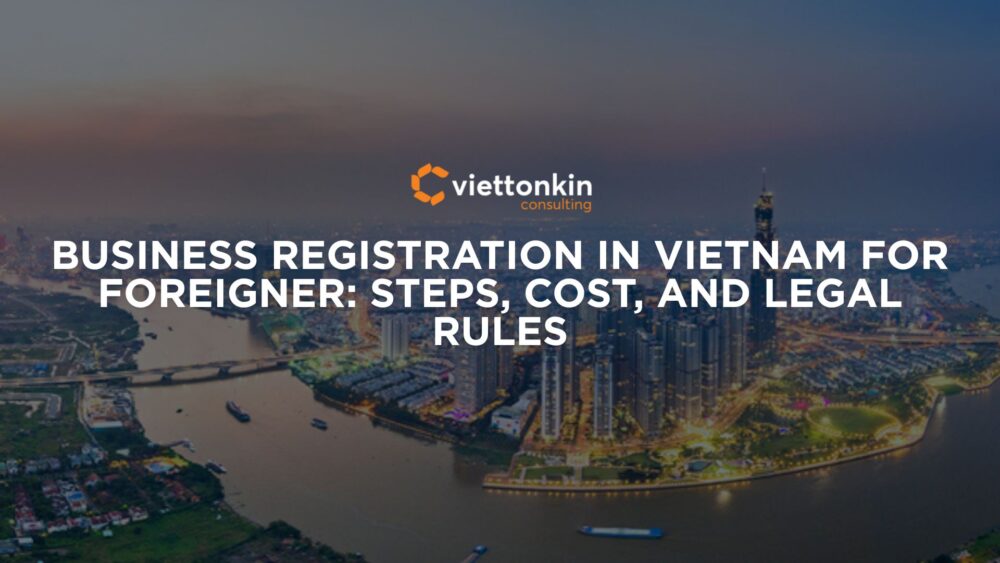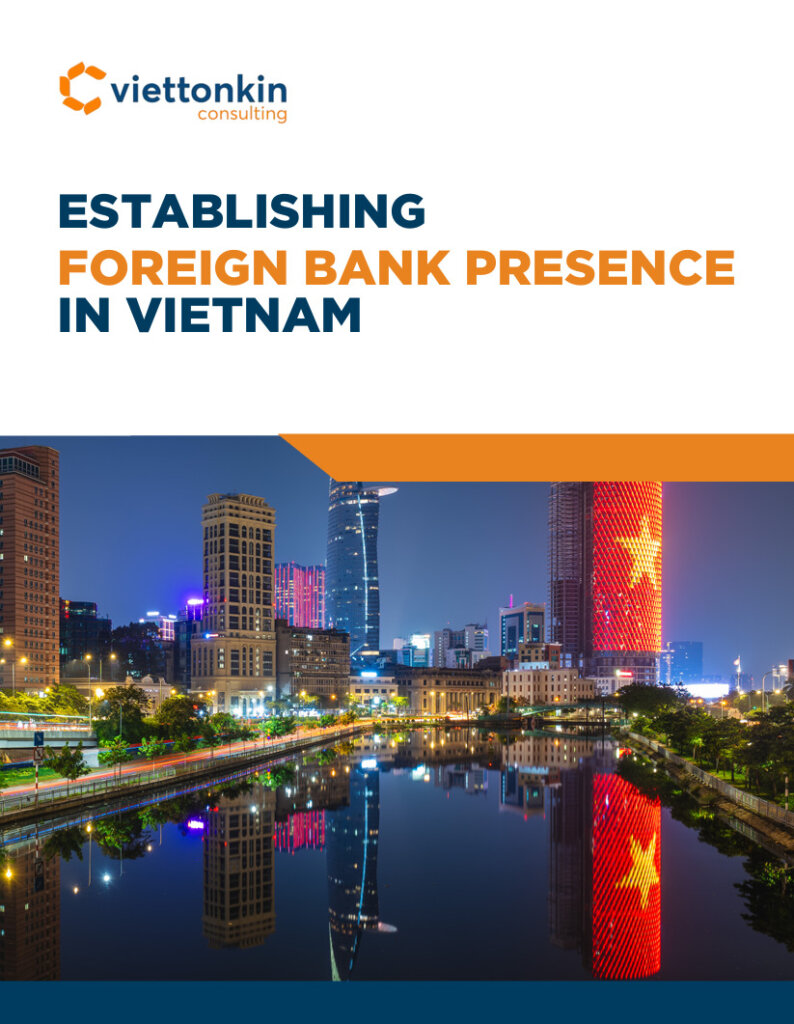Vietnam's food trade industry is one of the most dynamic sectors in the country. Fueled by an expanding middle class, rising disposable incomes, and shifting consumer preferences, the increasing demand for high-quality food products is undeniable. From bustling markets in Ho Chi Minh City to modern supermarkets in other major cities, the opportunity for both […]
Why are so many global businesses setting up shop in Vietnam? As a strategic consultant who has guided over 2,000 companies through their ASEAN expansion journeys, I’ve seen the meteoric rise of Vietnam as a premier destination for foreign direct investment. The combination of growth, talent and business-friendly reforms has created a wave of opportunity.
Vietnam’s competitive labor costs are a major draw for foreign investors, it’s affordable and attractive compared to other regional markets. For founders, consultants and market entry teams, understanding how to register your business here isn’t just a procedural step—it’s the first move in a winning strategy.
Key Takeaways
- Foreigners can register and own 100% of a company in many sectors in Vietnam, but the process is structured and requires adherence to the Law on Investment and Law on Enterprises.
- The registration process involves three stages: Investment Registration Certificate (IRC), Enterprise Registration Certificate (ERC) and post-registration compliance steps (per Investment Law 2020 Art 36 and Enterprise Law 2020 Art 27).
- Under Enterprise Law 2020 Arts 11–17, you can form a Single‑member or Multi‑member LLC (1–50 members) for straightforward management, or a JSC (≥3 shareholders) if you aim to issue shares, hold AGMs, and pursue external fundraising or public listing.
- According to Enterprise Law 2020 Art 35 and Decree 31/2021 Art 6, most business lines have no fixed minimum capital. You must declare an amount sufficient for your stated activities—DPI will assess—and contribute it in full within 90 days of ERC issuance to avoid sanctions.
- Meeting key compliance requirements is essential for foreign companies, staying compliant with local regulations and deadlines helps avoid legal risks and ensures smooth business operations.
- Common pitfalls include choosing the wrong business codes and submitting incomplete or poorly translated documents, which can cause significant delays.
Introduction: Why Foreigners Are Registering Businesses in Vietnam in Record Numbers

Vietnam’s growth, talent and FDI-friendly reforms
Vietnam’s appeal is no secret. The country has been growing consistently, with a stable political climate and a government that is actively courting foreign investment. It’s a powerful combination: a market with a rapidly growing middle class and an export hub with a skilled, cost-competitive workforce. This isn’t just a trend; it’s a fundamental shift in the global economic landscape.
Who this guide is for: founders, consultants and market entry teams
This guide is for the doers, the entrepreneurs who want to launch, the consultants who are mapping out regional expansion for their clients and the corporate teams who need to establish a presence in Southeast Asia. You need a clear, actionable plan to navigate the registration process and that’s exactly what we’ll deliver.
Viettonkin’s role: 2,000+ company registrations across ASEAN markets
With over 15 years on the ground in dynamic markets like Vietnam, China and Malaysia, my team at Viettonkin has managed thousands of company formations. We turn regulatory requirements into a competitive advantage, so your market entry is not just successful but seamless.
As company registration advisors to foreign investors, we offer expert support to navigate the legal and procedural requirements of business registration in Vietnam.
Can Foreigners Register a Business in Vietnam?
Yes, but conditions vary by sector and structure
The short answer is a definitive yes. Vietnam’s Law on Investment and Law on Enterprises explicitly allows foreign ownership. However, the level of access depends on your chosen industry. While many sectors like IT and manufacturing are open for 100% foreign ownership, others are considered “conditional” and may have specific requirements or ownership caps.
Step-by-Step: How to Register a Company in Vietnam as a Foreigner

The registration process is a structured journey with clear milestones. This step-by-step guide covers all the main stages of company establishment for foreign investors in Vietnam. A helpful overview from BBCIncorp outlines three main stages for foreigners starting a business in Vietnam, which I’ll detail below.
Pre-check: business activity, capital, location
Before you draft a single document, you must have clarity on three points:
- Business Activities: What, specifically, will your company do? You must align this with Vietnam’s official industry codes.
- Capital: How much will you invest? This must be a reasonable amount to sustain the business, and the declared capital should be aligned with a comprehensive business plan to meet legal and operational requirements.
- Location: Where will your business be located? Most business requires a valid physical address and a lease agreement in Vietnam to fulfill registration and compliance obligations.
Step 1: Investment Registration Certificate (IRC)
The investment registration certificate (IRC) is the first major hurdle and a mandatory step in the company registration process for foreign investors in Vietnam. As explained in a legal analysis by Conventus Law, this certificate doesn’t register your company but rather validates your investment project. It tells the government who you are, what you plan to do and that your project is approved. This process takes 15-20 working days.
Step 2: Enterprise Registration Certificate (ERC)
Once you have the IRC, you can apply for the ERC. The Enterprise Registration Certificate is the business registration certificate, providing legal recognition for your company in Vietnam. This is the document that officially gives birth to your company as a legal entity in Vietnam. It contains your company name, address, tax number and legal representative. This step is much faster, usually taking about 5-7 working days.
Step 3: Post-registration steps (tax, seal, account, reporting)
You’ve got your licenses, but you’re not ready to operate yet. A comprehensive guide for foreign investors on Vietnam Insiders highlights these crucial final steps. Thanks to a new, streamlined One-Stop-Shop (OSS) system, the Enterprise Registration Certificate (ERC) approval now automatically issues your Business Identification Number (NIB). This digital process consolidates your tax, API, and social insurance registrations, eliminating the need for separate filings.
After this, you will need to:
- Carve the official company seal.
- Open your corporate bank accounts (for both capital and operations).
- Set up your initial accounting and reporting systems.
Entity Types Foreigners Can Register
100% Foreign-Owned Company (LLC or JSC)
This is the most popular route. Vietnam allows full foreign ownership in many sectors, so foreign investors can establish and control their companies without local partners.
You can choose between:
- Limited Liability Company (LLC): Limited liability companies are a popular choice for both foreign and local investors due to their legal recognition and flexible structure. Perfect for most SMEs and service businesses. It has a simpler corporate structure.
- Joint-Stock Company (JSC): The structure of choice if you plan to raise capital from multiple investors or list publicly in the future.
Joint Venture with a Vietnamese partner
In certain "conditional" sectors, such as education, logistics, and healthcare, a Joint Venture with a local partner is a common, and often legally required, approach for foreign investors. Vietnamese law, as outlined in the Investment Law, mandates sector-specific ownership regulations that may limit foreign capital or require a partnership to comply with shareholding thresholds. These partnerships not only ensure legal compliance but also provide valuable local knowledge and networks.
Representative Office (non-trading)
If you're not ready to commit to a full-scale company, a Representative Office (RO) is a great starting point. As a non-trading unit, it allows you to establish a market presence, conduct research, and promote your brand without generating revenue or signing contracts. As per Investment Law 2020 Art 45 and Circular 08/2015, an RO is licensed by the Ministry of Planning and Investment (MPI) and requires one Chief Representative, up to 10 staff, and mandatory annual activity reports to maintain its status.
Branch of a foreign company
In some industries, a foreign company can register a branch, which is a dependent unit of the parent company rather than a separate legal entity.
How Much Does It Cost to Register a Business in Vietnam?
Government fees (IRC, ERC, seal, tax code)
The official government fees for the registration process itself are quite low, typically less than $200 USD. These are administrative charges for issuing the certificates and public announcements.
Legal and advisory costs (translation, notary, compliance)
The most significant part of your setup budget will be for professional advisory services. Engaging a reputable law firm is essential for managing legal procedures, compliance and document preparation during business registration in Vietnam. This is not a cost; it’s an investment in getting it right the first time. These fees cover managing the entire application process, translating and notarizing documents and ensuring your structure is compliant and optimized for your business goals.
Capital Requirements and Banking Rules
No universal minimum, but sector-specific capital may apply
For most business lines, there is no legally mandated minimum capital. However, the licensing authorities will assess whether your proposed capital is “reasonable” enough to fund your stated business activities. For conditional sectors like finance, real estate or education, specific minimums are often required.
Capital contribution timeline (90 days post-ERC)
Once your ERC is issued, you have a 90-day window to contribute the full registered charter capital into your company’s direct investment capital account. Failure to do so can result in penalties.
Foreign currency bank accounts and remittance
As a foreign-invested enterprise, you can legally open bank accounts in foreign currencies, receive funds from abroad and repatriate your profits back home, subject to tax regulations.
Ownership Rules by Industry
100% foreign ownership allowed in most sectors
Vietnam has opened its doors wide in many areas. Manufacturing, IT services, software development and consulting are just a few of the sectors where you can set up a 100% foreign-owned enterprise with confidence.
Restricted/conditional sectors (retail, logistics, advertising, travel)
For sectors like retail distribution, logistics, tourism and advertising, specific conditions and licensing requirements apply. This is where strategic insight is crucial to structure your entry correctly.## Common Mistakes Foreigners Make During Registration
Choosing the wrong business scope or activity code
This is the number one cause of delays. If your business lines in your application are vague or don’t match Vietnam’s official classification system, your dossier will be rejected. Be precise here.
Missing documents or inconsistent translations
Simple administrative errors, like a missing notarized document or an inconsistent translation between your charter and your application, can set your timeline back by weeks.
What Happens After Registration?

Business Operations and Management in Vietnam
Once your company is registered, the real work of running a business in Vietnam begins. For foreign investors, business operations and management mean strict compliance with local regulations and being proactive.
A key part of company registration in Vietnam is having a valid physical business address. This is not just a formality. Your business license and all official correspondence are linked to this address, and authorities may conduct site visits to verify your presence. Equally important is your company’s charter, which must clearly state your business activities, capital contribution and management structure. Any changes to your company’s charter or business activities require approval from the relevant authorities, so keep these documents up to date and in line with your actual operations.
Appointing a legal representative is another crucial step. This person, who can be a foreigner, is responsible for the company’s legal obligations and must either have a valid work permit or at least 3 years of management experience. The legal representative acts on behalf of the company in all dealings with Vietnamese authorities, so choose someone with local knowledge and experience.
Financial management is a compliance area for foreign owned companies. You must open a bank account in Vietnam to handle all business transactions, including charter capital and loan capital. Both charter capital and loan capital must be registered with the authorities and all financial transactions must be recorded. Vietnamese law requires submission of audited financial statements annually and you must pay business license tax every year to keep your company in good standing.
Foreign companies can set up either a branch or a representative office in Vietnam, each with different operational scopes. A branch can do business and generate revenue but must comply with the same accounting and reporting standards as a local company. A representative office is limited to market research and liaison functions and cannot do direct business or earn income in Vietnam. Both types of offices must have a registered physical address and a designated legal representative.
Minimum capital requirements vary depending on your business lines and industry. While many sectors have no minimum, authorities will assess whether your registered capital is sufficient to support your stated business activities. Failing to meet these minimum capital requirements or to contribute your charter capital on time can result in penalties or even revocation of your business license.
To ensure compliance and avoid costly mistakes, it’s highly recommended for foreign investors to engage local law firms and accounting services. These partners can help you navigate the complexities of Vietnamese regulations, manage your financial statements and keep your company registration in good standing. With the right support, you can focus on growing your business in Vietnam while minimizing operational risks.
Tax registration and monthly/quarterly filing
Your compliance obligations start immediately. You must register for all relevant taxes, including Value Added Tax (VAT) and Corporate Income Tax (CIT) and begin your monthly or quarterly filing cycle.
Licensing (if conditional sector: retail, F&B, fintech)
If you are in a conditional sector, your ERC is just the first step. You must then apply for the specific sub-licenses required to legally operate which is a separate and often lengthy process.
HR, payroll, social insurance registration
Once you hire employees in Vietnam, you must comply with labor registration and social insurance requirements. Once you hire your first employee, you must register with the labor department and start contributing to Vietnam’s mandatory social, health and unemployment insurance funds.
Why Viettonkin Simplifies Business Registration for Foreign Investors
Full advisory: legal, tax, FDI structuring, HR, and licensing
We offer a true one-stop solution. Our team integrates legal advisory, tax structuring and operational setup under a single, cohesive strategy. We don’t just register your company; we build its foundation for growth. Our integrated approach ensures that the business owner receives comprehensive support in preparing documents, choosing the right services and fulfilling all legal requirements for company formation.
Case: how we registered a fintech firm + rep office in 45 days
For a European fintech client, we set up a dual entity: a Representative Office for market research and a full-fledged software development company to tap into local tech talent. By managing both registration processes in parallel and leveraging our deep connections with the authorities, we had both entities fully licensed and operational in 45 days.
Conclusion: Get Registered and Get Moving
Reframe: registration = step 1 of a larger expansion journey
Think of business registration not as a final destination but as the activation key for your entire Vietnam growth strategy. Getting it right from the start gives you the momentum to outpace the competition and seize the opportunities ahead. The only way is forward!
You might also like: FDI Company in Vietnam—What Foreign Investors Need to Know Before Setting Up












